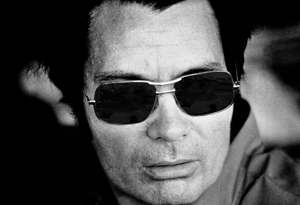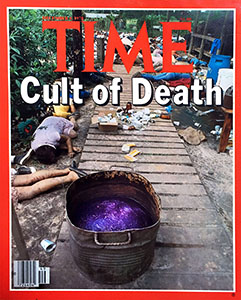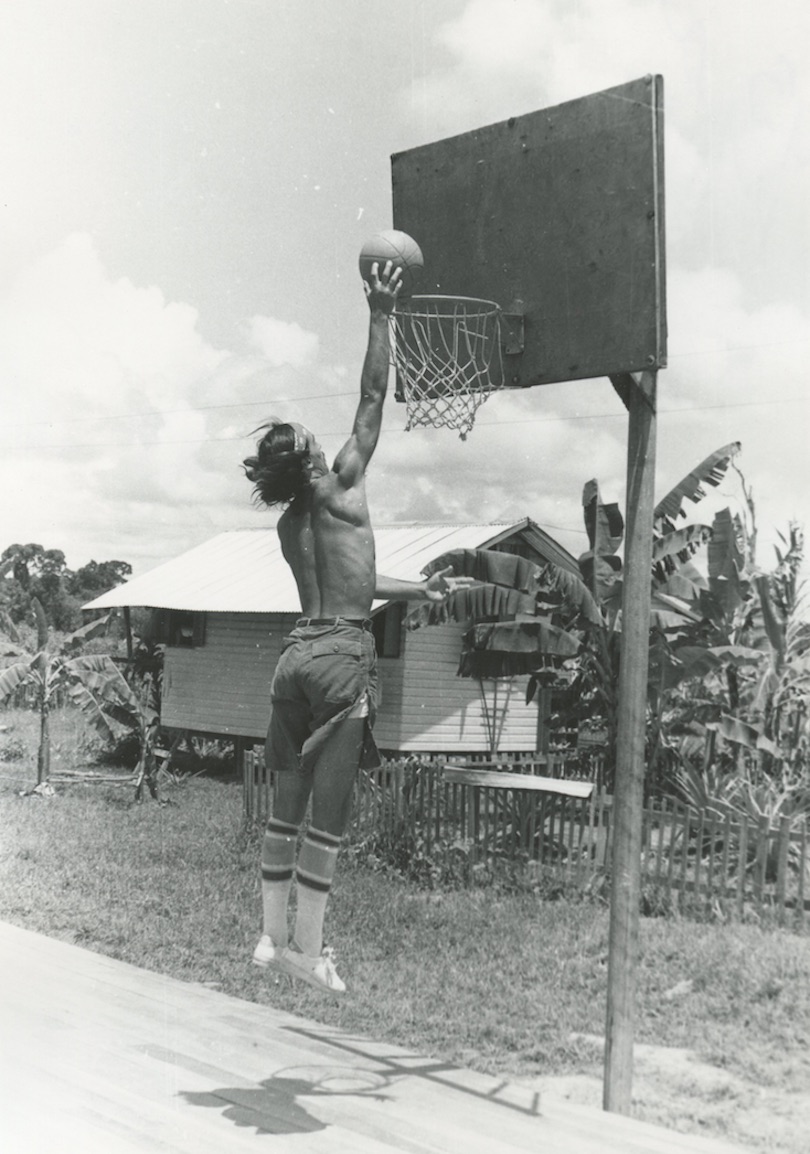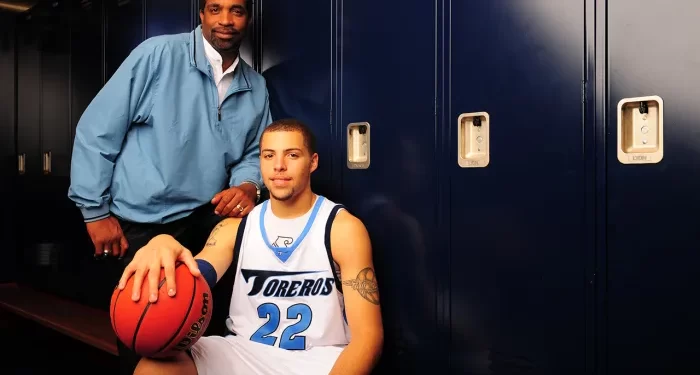By: Zachary Draves
One day a young boy, about five/six years old, was out in the yard with his father and they came upon a basketball. The little boy then asked his father to show him how to play. Not uncommon among parents with children wanting to take up new skills as part of their development and to establish a bond.
The difference in this instance was that the father, who had played basketball into his teen years, had put the game behind him and wanted nothing to do with it. But seeing the precious face of his little boy, he ultimately found himself in a position where he had begun the painstaking process of coming to terms with the reason he had abandoned the game in the first place.
Thus, a son began to save the life of his father.
That son, Rob Jones, would grow up to become a highly skilled high school, college, and international player with a diverse pedigree. He played at Saint Mary’s College in Moraga, California where he became a two-time first-team all-conference. He then played for the Cleveland Cavaliers in the 2012 NBA Summer League before taking his talents to Greece, Poland, Dominican Republic, Puerto Rico, and Australia.
He then became the Director of Player Development at Saint Mary’s, an assistant coach at UC Riverside, and is currently an assistant coach at the University of Hawaii. His father is Jim Jones Jr., the adopted son of the Rev. Jim Jones Sr.
Yes that Jim Jones, the founder of People’s Temple who was responsible for the largest mass suicide in history in Jonestown forty-five years ago.

(Courtesy: Associated Press)
By now anyone who is old enough to remember or learned about it in a high school or college sociology class understands Jonestown.
On November 18, 1978, over 900 men, women, and children of the racially diverse religious cult based in San Francisco, California were coerced by Jones Sr. into killing themselves by drinking a grape-flavored beverage laced with cyanide.

(Courtesy: David Hume Kennerly/Getty Images)
This came the day after a reception was held to welcome California Congressman Leo Ryan, his staff, members of the press, and family members who had left the church pledging with their loved ones to come home as part of an investigation into acts of abuse, isolation, and torture at the hands of Jones Sr. The reception was geared toward promoting the idea that Jonestown was a safe haven and that the people living there were living in bliss.
The next day, Congressman Ryan, three journalists, and an ex-temple member were shot and killed by Jones loyalist Larry Layton at the airstrip in Port Kaituma as they were set to board a plane to take them back to the states. Nine others were wounded including Ryan staffer Jackie Speier, who would survive a shot in the head and would go on to become a Congresswoman from California.

(Courtesy: David Hume Kennerly)
As all this was happening, Jim Jones Jr., his brothers Stephen, Tim, and others were 150 miles away in Georgetown, Guyana playing in a basketball tournament they helped put together with the permission of the Guyanese government.
Jones Jr. and his brothers had been playing basketball since grade school all the way until high school, much like their father did who in turn became their manager for both basketball and baseball. During the construction of Jonestown, Jones Jr. found a way to incorporate the game as part of the church’s expansion efforts.

(Courtesy: Youtube)
“When we got to Jonestown, we built a basketball court,” he said in a rare exclusive phone interview with Team NBS Media. “That was our relaxation. When I went to Georgetown to do PR for Peoples Temple, my brothers’ uncle said let’s have a basketball tournament. When went to the Ministry of Sport in Guyana and proposed the idea. He said yes and my father liked the idea.”
It was a way to project a positive image of People’s Temple.

(Courtesy: Laura Johnson Kohl and Fielding McGee/Jonestown Institute)
The tournament consisted of various national teams including Guyana and Grenada and it all coincided with Congressman Ryan’s visit. When Jones Sr. requested his sons to come back to Jonestown, it was Stephen who told him no because they were in the midst of the tournament.
As it turned out, they were playing against the Guyanese team.
“The congressman went ahead to Jonestown and the day the congressman landed, we played the Guyanese team, ” said Jones Jr. “We were up by ten points at halftime, but we lost by ten points at the end of the game.”
Ultimately, basketball saved his life, Stephens’ life, and members of the team who weren’t present when the massacre unfolded. Tragically, Jones Jr lost his wife, unborn child, siblings, and his parents.
In the years afterward, he had battled addiction and survivors’ guilt. When it came to basketball he stayed as far away as he could, even turning the channel anytime a game would come on the television.
Until a young Rob brought him back to life with the ball in the yard, beginning with teaching him how to dribble.
As Rob’s passion grew, his fathers was reborn. Jones Jr. would become Rob’s coach at times and he has taken great pleasure in seeing Rob’s ascendance through virtually every aspect of the game. Rob was also a stellar football player in high school and was invited to try out for the Minnesota Vikings, but his love for basketball was too strong for him to think about going another route.
When it comes to the family history, Rob has had to navigate the potentially treacherous journey of going to school and learning about it, unsure if his peers were able to put two and two together. However, whenever he is asked, Rob hasn’t been shy in sharing about it.
“The way my dad has handled this story for long I have been very open about it because it is more of his story than anything so it has allowed me to be very transparent with it” he said in a phone interview with Team NBS Media. “Maybe the anniversary will ruffle some feathers, but I will be open and willing to talk about it if anyone asks questions.”
If anything it is a way of honoring his father and his ability to overcome so much. It is those tangibles that have carried Rob in his coaching career and wanting to have an impact on his players’ lives.
“Sport brings people together,” he said. “I always tell my players what has echoed throughout our program, is we have to come together. We lean on each other. We depend on each other. We all stem off from each other. There are five players on the court, fifteen players on the team, your staff, and your support staff. You need every single piece.”
Today, Rob’s commitment to the game has never wavered as he begins his second season at Hawaii. As for this anniversary, he will continue to do what he has done throughout his life.
“To me, it is not just another day, it is a symbol of what I took from my dad to get where he is at” he said. “Life is going to throw things at you that you can’t control, sometimes your family is a part of it, but how you respond to those events is even more important.”
His father is also not far away as he fanatically keeps up with his son’s schedule, waking up early in the morning from Northern California to watch the games. He is also part of a group text with his sons where they talk about anything and everything, especially basketball.
Whenever it’s game day, Rob can always expect a text from Dad that reads “good luck”.
Jones Jr. is now enjoying the time he spends with his family which includes his wife of thirty-six years, two other sons, two granddaughters, and Stephen, with whom he shares a passion for following high school and college ball for its simplistic purity.
After the horror he endured and its lasting effects, he has found peace and it was his son that provided that for him.
“In the horror of the story, there were some bright lights, those bright lights were basketball”, he said, “Basketball was my lifeline and I passed it on to Rob and passed it on to be a part of the community with my other sons. Passed on that sense of community.”
He also takes solace in the classic Frankie Beverly and Maze song “Joy and Pain”, which describes how they are like sunshine and rain, sometimes interwoven. A song that perfectly encapsulates the relationship between Rob and Jim.
Through a simple game called basketball, a fathers’ pain was healed by a sons’ joy.


 NFL
NFL

